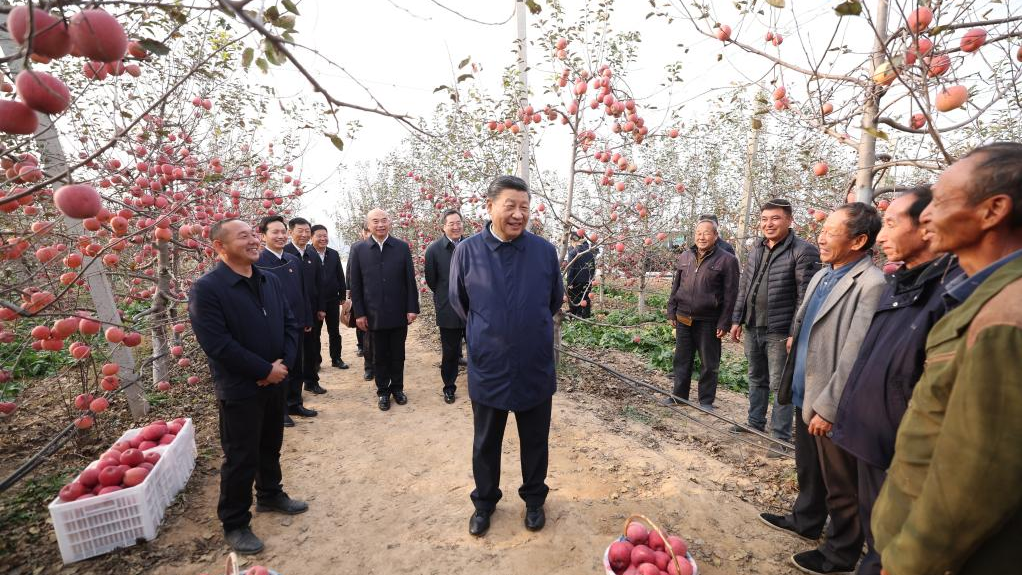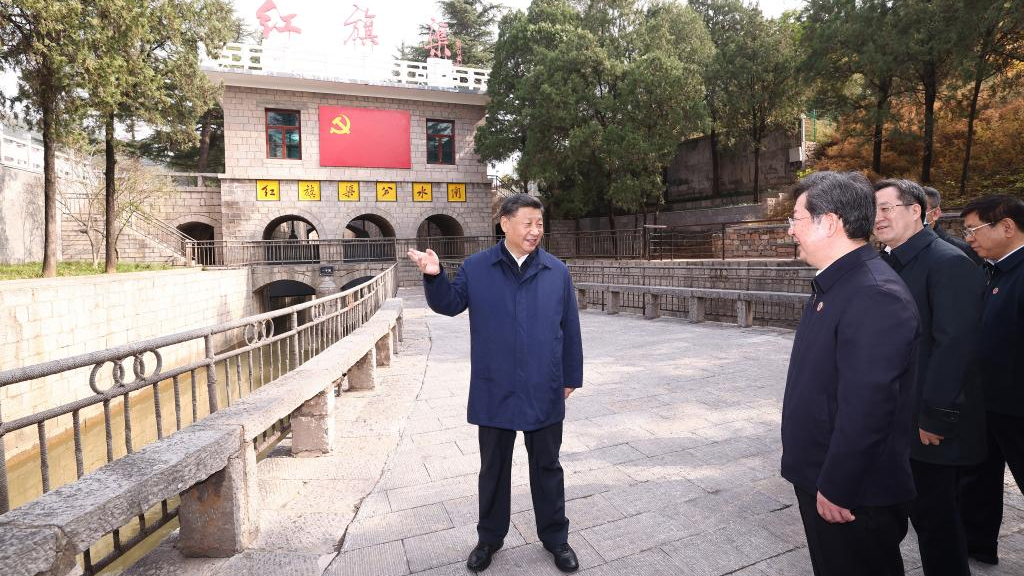
Chinese President Xi Jinping, also general secretary of the Communist Party of China Central Committee and chairman of the Central Military Commission, chats with local villagers in an orchard in Nangou Village of Yan'an, northwest China's Shaanxi Province, October 26, 2022. /Xinhua
Chinese President Xi Jinping, also general secretary of the Communist Party of China Central Committee and chairman of the Central Military Commission, chats with local villagers in an orchard in Nangou Village of Yan'an, northwest China's Shaanxi Province, October 26, 2022. /Xinhua
Editor's note: Xin Ge is an associate professor at the School of Public Economics and Administration, Shanghai University of Finance and Economics. The article reflects the author's opinions and not necessarily the views of CGTN.
Less than one week after the conclusion of the historic 20th National Congress of the Communist Party of China (CPC), Xi Jinping, general secretary of the 20th Central Committee and also the president of China, made an inspection trip to rural areas in northwest China's Shaanxi Province and central China's Henan Province.
In the inspection, Xi underscored the importance of consolidating and expanding China's achievements in poverty eradication and called for the advancement of rural revitalization in full swing to achieve agricultural and rural modernization. As he said, "the most arduous task in building a modern socialist country remains in the countryside."
Why did Xi make his first inspection stop in Yan'an, a city in northwest China's Shaanxi Province in his third term? Yan'an used to be a crucial old revolutionary base of CPC and was also a deeply impoverished area. During the 13 years (1935-1948) in Yan'an, the Central Committee of CPC formulated and implemented an array of principles and policies, achieved great development of revolutionary forces, and led the War of the Chinese People's Resistance against Japanese Aggression to the final victory, laying a solid foundation for the eventual victory of the new democratic revolution.
Xi spent seven years as an "educated youth" from 1969 living and working alongside farmers in Liangjiahe, a barren and desolate mountainous village in Yanchuan County of Yan'an. He clearly knew how life was harsh there – people lived in simple caves and slept on beds made of brick and clay. Xi joined the CPC there and later became village Party chief. He kept thinking about ways to make their lives better.
As he recalled, the earnest wish then was "to make it possible for the villagers to have meat and have it often." Since he laid top priority for the villagers to food production, he proposed meliorating the local soil conditions by building a dam, which transformed a large area of arid land into productive fields, quintupling yields from 1,500 kg per hectare to about 7,500 kg. The annual income per capita of the Liangjiahe village rose from 9,600 yuan ($1,478) in 2014 to 21,634 yuan ($3,335) in 2019.
Ever since Xi assumed the Party Secretaryship in the 18th National Congress of the CPC of 2012, Xi has prioritized work related to agriculture, rural areas and farmers, collectively known as "three rural issues." Such matters are deemed as critical to the country's development and rural people's well-being.
In February 2015, Xi presided over a symposium in Yan'an on poverty alleviation in the revolutionary areas of Shaanxi, Gansu and Ningxia and delivered a speech that pointed out the direction for furthering eradicating poverty.

Chinese President Xi Jinping, also general secretary of the Communist Party of China Central Committee and chairman of the Central Military Commission, views the Hongqi Canal in Linzhou City, central China's Henan Province, October 28, 2022. /Xinhua
Chinese President Xi Jinping, also general secretary of the Communist Party of China Central Committee and chairman of the Central Military Commission, views the Hongqi Canal in Linzhou City, central China's Henan Province, October 28, 2022. /Xinhua
At the 19th National Congress of CPC in 2017, the "Rural Revitalization" strategy was formally introduced by Xi, followed by the 2018-2022 Strategic Planning for Revitalization of Rural Areas, the 14th Five-year Plan covering 2021-2025, the establishment of a dedicated institution - the National Administration for Rural Revitalization to replace the Office of Poverty Alleviation and Development of the State Council, and the promulgation of the Rural Revitalization Promotion Law.
The Rural Revitalization strategy contains two long-term goals: to achieve "decisive progress on rural revitalization" by 2035 and be "fully rejuvenated with well-off farmers and strong agricultural sectors" by 2050. To achieve these goals, the strategy emphasizes policies such as encouraging small-scale farmers to adopt modern farming and agricultural practices, upgrading agricultural technology and machinery, improving the property rights of farmers, and requiring local governments to repair environmental degradation, among many others.
These tireless efforts for rural development have witnessed fruitful results. As the largest developing country in the world, China eliminated poverty in entire regions and eradicated extreme poverty in February 2021, lifting more than 850 million Chinese out of poverty over the past four decades. According to the World Bank's International Poverty Standards, this population accounted for three quarters of the global total in the same period. China successfully met the poverty eradication target set out in the UN's 2030 Agenda for Sustainable Development ten years ahead of schedule.
Rural infrastructure and essential public service has also been greatly ungraded. From 2016 to 2020, more than 1.4 million kilometers of rural roads were constructed, and the total length of rural roads are planned to reach five million kilometers by 2035. Communications infrastructure has been extended in poverty-stricken areas – now over 98 percent of poor villages have access to optical fiber communications and 4G technology.
The reformation and development of rural China have created ripple effect from villages to industries such as agtech, food security, environment repair and waste management. The average net income of people who have shaken off poverty has reached 12,500 Chinese yuan ($1,870), 16.5 percent higher than the previous year, according to official statistics.
Chinese modernization is the modernization of common prosperity for all, according to the landmark report delivered to the 20th National Congress of the CPC. The report especially notes that the country will steadily promote the revitalization of businesses, talent, culture, ecosystems and organizations in the countryside. It is apparent that rural modernization in China cannot be accomplished without the national strength and more importantly, the CPC leadership, which not only provides the vision and direction for rural revitalization, but also constantly supervises the progress and advanced the implementation of innovative projects and programs.
(If you want to contribute and have specific expertise, please contact us at opinions@cgtn.com. Follow @thouse_opinions on Twitter to discover the latest commentaries in the CGTN Opinion Section.)